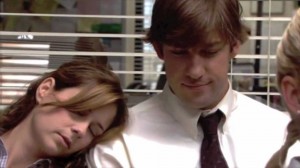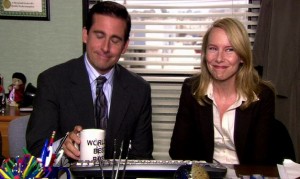No show will ever impact me the way that the US version of The Office did. It was the show that taught me to love television as an entertainment medium, and it remains one of my favorite shows of all time.
I grew up watching cartoons and multi-camera sitcoms, so when my friend Tyler (who is responsible for introducing me to many entries on this Top 100) insisted I watch this show, it was a bit of a culture shock.
I’d never seen anything like it before. Beyond being hilarious, this workplace comedy about an exceedingly bland paper-selling company was also interested in telling an actual story. This was a show curious about the way people deal with small defeats and victories, and questioned if there was meaning in living such a small and low-key life. The Office often portrayed sophisticated characterization and emotions. Among the pranks and silliness were plots with conflicts that had no easy answer.
And the storytelling was so different from anything I’d previously watched. The “mockumentary” premise meant that the show used an aesthetic of realism, pleasantly muted and making use of cinematic subtlety.
I also was astonished at the way characters developed and stories evolved over multiple episodes. The most memorable plot from the earliest seasons is one of my favorite stories from any show: the Jim-Pam-Roy love triangle.
I genuinely believe that Pam and Jim’s slowly-gestating romance is the most effective TV romance I’ve ever seen, especially among sitcoms (which are notorious for botching love stories in the name of laughs). No comedy has ever plotted such a compelling love story over its whole duration, with astonishingly few errors.
genuinely believe that Pam and Jim’s slowly-gestating romance is the most effective TV romance I’ve ever seen, especially among sitcoms (which are notorious for botching love stories in the name of laughs). No comedy has ever plotted such a compelling love story over its whole duration, with astonishingly few errors.
On top of the way the show wrote the pairing, Jenna Fischer and John Krasinski have astonishing chemistry together. Fischer is a brilliant actor, outclassing almost everyone else in the cast (and a mind-boggling Emmy goose egg), while Krasinski is immensely charming and perfectly cast as hopeless romantic Jim. Together, they were always convincing.
 But of course, the core of the show was always Steve Carell as hapless boss Michael Scott. He’s on the shortlist of the greatest TV comedy characters and performances in TV history (quite possibly #1 in my book). The role required an actor with Carrell’s stature: someone who could charm you even as he repulsed you; someone who could make you laugh one minute, then floor you with a dramatic moment the next; and someone who could always ground the worst, most cartoonish writing with genuine pathos and humanity.
But of course, the core of the show was always Steve Carell as hapless boss Michael Scott. He’s on the shortlist of the greatest TV comedy characters and performances in TV history (quite possibly #1 in my book). The role required an actor with Carrell’s stature: someone who could charm you even as he repulsed you; someone who could make you laugh one minute, then floor you with a dramatic moment the next; and someone who could always ground the worst, most cartoonish writing with genuine pathos and humanity.
Carell was the crutch that the writers could lean on, and they eventually figured out that they should give him the show’s best stories. A particular favorite is Michael feuding with an uptight boss (Idris Elba of The Wire) and quitting to start his own paper company, though his various romances were all fascinating (usually dysfunctional) in their own ways.

My OTP
The supporting cast was also fantastic, almost an embarrassment of riches. Rainn Wilson is admirably insane as Dwight Schrute; the show never quite figured out Andy Bernard’s personality, but Ed Helms threw everything he had into the role and became a breakout star; Leslie David Baker deserves some sort of award for his dry portrayal of Stanley Hudson, my favorite background player; and Amy Ryan as Holly Flax, Michael’s adorable girlfriend from Season 5, is an all-time favorite guest star of mine. But that barely scratches the surface: Kevin, Angela, Oscar, Jan, Meredith, Angela, Toby, Kelly, Ryan, Darryl, Erin, and — of course — Creed all had brilliant moments.
What this high ranking really comes down to, I guess, is a simple emotional reaction: I really, really loved this show. So much. It was the perfect show at the perfect time for me. Through those first five seasons, I watched nearly all of the episodes live, and often multiple times during the week. Between each season, I would rewatch the entire run of the series up to that point.
I hit a tipping point early in the sixth season. My love faded as I encountered great new shows and The Office lost much of its magic. In early 2010, for the first time in four years, I had a new favorite show on TV (Community). By the eighth season, I had really soured on the diminished writing and the Steve Carell-shaped hole following Michael’s departure from the show.
I hopped back on the train for much of the ninth and final season. I was happy to rekindle my affection and revisit characters who felt like old friends. The show went out on a note of intense sentimentality, and I was pleased that the show said goodbye in a warm, pleasant way.
These days, I find my heart fond towards The Office (both Offices, actually). The sting of the show losing its transcendence for the second half of its run has worn off. I now realize that all comedies do that, no matter how good they are. I also realize it’s hard to intensely love a show for nine years, regardless.
I am so thankful for The Office and the ways it taught me to watch TV. It showed me how satisfying a well-done comedy could be in just 22 minutes per episode, and that’s something I’ve rarely wavered on. I watch way more TV comedy than drama, and part of me wonders if that’d be true if the first TV show I really followed had been a drama or even a comedy with less substance or craft.
In some of the previous entries about TV shows, I’ve traced the show’s arc through its duration, discussing highlights and lowlights of each season. But I’ve already written this type of retrospective about The Office for Character Grades! So I’m just going to link you there:




